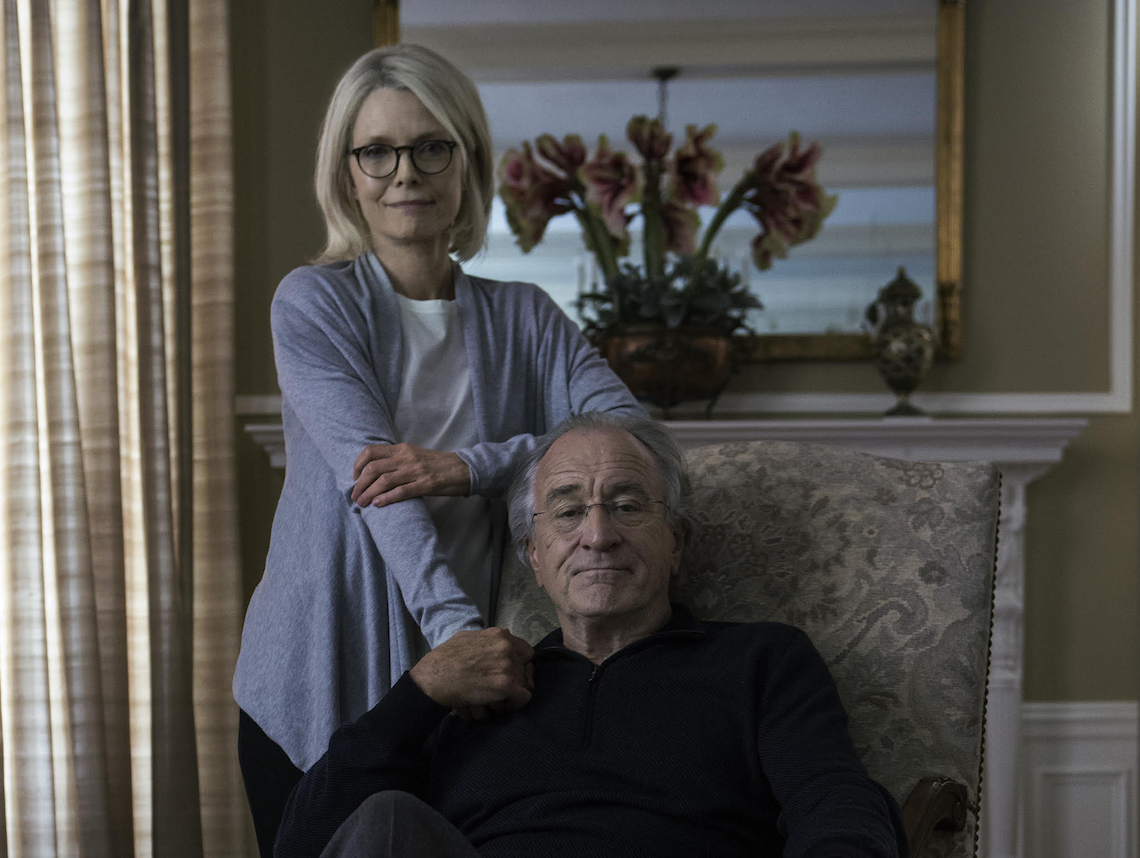 Robert De Niro stars as Bernie Madoff in HBO’s “The Wizard of Lies,” while Michelle Pfeiffer plays his wife, Ruth. Photo by Craig Blankenhorn/HBO
Robert De Niro stars as Bernie Madoff in HBO’s “The Wizard of Lies,” while Michelle Pfeiffer plays his wife, Ruth. Photo by Craig Blankenhorn/HBO “Do you think I’m a sociopath?” Bernie Madoff, serving a 150-year prison sentence, asks visiting New York Times investigative reporter Diana B. Henriques in a scene from the HBO film “The Wizard of Lies.”
She doesn’t answer the question, but the title of the movie, which debuts on May 20 and is based on the book by Henriques, is enough to suggest her conclusion, practically defining a pathologically deceitful person.
Madoff, who marked his 79th birthday on April 29 at a federal prison in North Carolina, holds the dubious distinction of perpetrating the biggest financial fraud by an individual in American history. By the time of his arrest in 2008, Madoff had swindled his clients out of some $65 billion, mostly in fabricated gains, though “only” around $18 billion in actual losses.
According to reporting by The Wall Street Journal and the Los Angeles Times, among those left holding the bag locally were the Jewish Community Foundation of Los Angeles, to the tune of $18 million (which included $6.4 million lost by The Jewish Federation of Greater Los Angeles). Nationally, victims included the Hadassah women’s organization ($90 million), Yeshiva University ($140 million) and the Elie Wiesel Foundation for Humanity ($15.2 million).
In the years before his exposure, Madoff was hailed as a financial genius by the media and investors, and the famous and wealthy begged him to accept their million-dollar checks, no questions asked.
In reality, Madoff ran a giant Ponzi scheme, in which his clients earned dividends of 10 percent or higher like clockwork, year after year. This operation worked as long as a steady stream of new big-time investors channeled fresh funds to Madoff, allowing him to pay generous dividends to his old investors — and providing him with a billionaire lifestyle in Manhattan and Florida.
But in 2008, when the stock market plunged and large investors tried to pull their money from Madoff-controlled funds, the “financial genius” desperately scrambled for an infusion of new money. He failed and the Ponzi pyramid collapsed.
In a dramatic scene in “The Wizard of Lies,” Madoff confesses to having lived a lie to his immediate family members, who also pay heavily for his crimes. His wife, Ruth, is portrayed by Michelle Pfeiffer as a once reigning society hostess now shunned by all. In the privacy of their bedroom, she asks only one question: “Why, Bernie? Why?”
He replies, weakly, “I didn’t mean to harm anyone. I just couldn’t stop.”
Two years after Madoff’s arrest, his older son, Mark (Alessandro Nivola), committed suicide by hanging himself, leaving behind a bitter note blaming his father. Even that was not the end of the family’s misery, as younger son Andrew (Nathan Darrow) died of cancer at 48 in 2014.
For “The Wizard of Lies,” veteran director Barry Levinson, whose resume includes such classics as “Rain Man” and “Good Morning, Vietnam,” put major emphasis on the relationships within the Madoff clan.
His film follows ABC’s “Madoff,” a four-episode miniseries with Richard Dreyfuss in the title role and Blythe Danner as Ruth, which aired in 2016. It focused primarily on the mechanics of Madoff’s Ponzi scheme in particular and of Wall Street operations in general.
For the lead role in his film, Levinson chose Robert De Niro, not the first name that comes to mind to portray an aging, near-sighted Jewish swindler. But Levinson noted to the Journal that De Niro, with some minor hairstyling, looks a lot like Madoff.
More important, Henriques, who interviewed the real Madoff in his jail cell for her book and then De Niro in the film (where she appears as herself), told the director that the Italian-American actor uncannily “got” the persona of Madoff.
To the surprise of some worriers, the exposure of Madoff’s misdeed did not lead to any widespread anti-Semitic backlash, except among some fringe websites and bloggers. It probably helped that Madoff swindled Jews, Catholics, Protestants and agnostics with equal gusto and lack of remorse. The reaction against the Jewish community might have been a lot stronger if Madoff had targeted only gentiles, Levinson speculated.
Regarding Madoff’s clients, was it possible that they were, in effect, his accomplices by letting their greed overcome their normal skepticism about a deal that appeared too good to be true? Levinson answered by observing it was part of Madoff’s shrewdness that he didn’t overplay his hand. While some scammers might have promised investors returns of 40 to 50 percent, Madoff stuck to around 10 percent, thus passing as a relatively “conservative” money manager.
Possible investors also were disarmed by Madoff’s personality. “He was not flashy, not a big talker, not incredibly charming, but more of a quiet, reserved man — that was his con,” Levinson said.
In any case, the director doubts that Americans will absorb any permanent lesson from his film or from Madoff’s ultimate fate.
“After that scandal, we tightened some stock market regulations, but they are now being rolled back,” Levinson said. “We haven’t learned anything, so we will be screwed again. We’ll always have flimflam operators. … We now have a president who says things which are not true, but people believe him.”
“The Wizard of Lies” will debut May 20 at 8 p.m. on HBO.






















 More news and opinions than at a Shabbat dinner, right in your inbox.
More news and opinions than at a Shabbat dinner, right in your inbox.